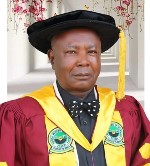on Building Project Delivery
in Enugu State
FEATURED PAPER
By Anthony N. Ezemerihe1, Kevin C. Okolie2, and Dominic A. Obodoh2
1Enugu State University of Science and Technology, Enugu
2Department of Building, Nnamdi Azikiwe University, Awka
Nigeria
ABSTRACT
The study examined the impact of the constraint factors on building projects delivery in Enugu State, Nigeria and suggested possible ways to mitigate the impact in order to deliver successful sustainable building in the state. Nine local government areas (three each from the three senatorial zones of the state) were sampled based on urbanization and population of inhabitants in the area. A total of four hundred (400) questionnaires were distributed to stakeholders in the built environment while three hundred and forty-four (344) representing 86.0% of the respondents were returned and used for the analysis. The data was analyzed using common size percentage analysis, mean score using five-point Likert rating scale, severity index/ranking, regression and correlation analysis. The results show that Database for building projects and streamline procedure to implement sustainability of building projects ranked first among the factor variables with mean score of 4.69 and severity index of 93.7% followed by un-built areas as indicated in the site plans need further landscape deign to achieve sustainable development. The least in the ranking was inadequate provision for protection of existing and future environmental issues in the master plan for proper enforcement. The work concluded that the sustainable development concepts applied to design, construction operation and maintenance with whole life assessment of buildings can enhance the economic welfare, environmental health and social well-being of communities in Enugu state. The study recommended the creation of database for sustainable building projects, articulation of strategies by liaison with existing agencies/stakeholders and legislation to back up all the recommendations for proper enforcement.
Keywords: Sustainable buildings, sustainable design and construction, impact factor variable, sustainability.
1.0 INTRODUCTION
Construction is one of the largest industries in both developing and developed countries in terms of investment, employment and contribution to Gross Domestic Product (GDP) of any Nation. Its impact on the environment is considerable particularly in areas of energy use, soil degradation, loss of agricultural land, forests and wild lands, air and water pollution, and depletion of non-renewable energy sources and minerals (Ametepy, Ansah and Gyadu-Asiedu, 2020). The construction industry accounts directly and indirectly for nearly forty percent (40%) of material flow entering the world economy (Clement, Cheng and Hong, 2018); and in developing countries for around fifty percent (50%) of the total energy consumption (Ametepyet al., 2020; Ibrahim and Price, 2005).
Aluko (2011) stated that, in Nigeria, many laws and regulations were enunciated at Federal, State and Local government levels for proper planning of the environment and building design architecture without integration of sustainability concepts. Most of the building projects are not sustainable which portends danger to the environment by degrading the natural design architecture. Although the principal indicators for sustainable development are not integrated at the planning stage for most building projects, their execution also lack proper monitoring by the policy makers (Udegbunam, Agbazue, and Ngang, 2017). These led to poor implementation during construction which drastically affects our living environment. Broman and Roberts (2017) assert that it is important to minimize the consumption because as material is consumed its chances for future use are diminishing; hence, its potential utility to future generation is lost. Embracing green or sustainable concept in design is aimed at reducing energy consumptions, operation and maintenance cost, reduce building related illness, increase the productivity and comfort of building occupants, reduce waste and pollution, increase building and component durability and flexibility. There is the need to integrate these at early stages of building, planning and construction process. However, sustainable development for building project delivery needs time, understanding, acceptance, adjustment and implementation. These can be achieved through awareness/commitment both on the part of individuals, community and professionals.
The transformation of sustainable construction policy into project level practice, are the non-technological institutional processes, which are dependent upon the industry structure, communication channels and the organization and strategic orientation of its constituent actors (Rohracher, 2001). The uptake and implementation of sustainable construction requires decision processes that are integrated across various project level interfaces demarcated by different phase of the construction life cycle. However, the challenging task may stem from the fragmented nature and complexity of the construction sector (Myers, 2005), the multi-dimensional nature of sustainable construction, the lack of a structured methodology and lack of information at various hierarchical levels (Ugwu and Haupt, 2007).
More…
To read entire paper, click here
How to cite this work: Ezemerihe, A. N., Okolie, K. C., Obodoh, D. A. (2024). The Impact of the Constraint Factors on Building Project Delivery in Enugu State; PM World Journal, Vol. XIII, Issue IV, April. Available online at https://pmworldlibrary.net/wp-content/uploads/2024/04/pmwj140-Apr2024-Ezemerihe-Okolie-Obodoh-Impact-of-Constraint-Factors-on-Building-Projects-in-Enugu-State-1.pdf
About the Authors

Anthony Nnamdi Ezemerihe
Enugu, Nigeria
![]()
Ezemerihe, Anthony Nnamdi holds a bachelor’s degree in Building from Enugu University of Science and Technology Enugu, Nigeria, Higher National Diploma in Building Technology and Quantity Surveying from Institute of Management and Technology (IMT) Enugu, Nigeria. Postgraduate Diploma (PGD) and Master of Business Administration (MBA) in Banking and Finance from Anambra State University of Technology (ASUTECH) Enugu. A master of Science (M.Sc) degree in Construction Management from Nnamdi Azikiwe University (NAU) Awka, Nigeria and he is presently rounding up his Doctorate degree in Construction Management at NAU, Awka. He is a registered Builder and Corporate member Nigerian Institute of Building (MNIOB), Nigerian Institute of Quantity Surveyors, Nigerian Institute of Management (MNIM), Nigerian Environmental Society (MNES) and passed with overall result A in Public Service Examination (PSE) from the Administrative Staff college of Nigeria (ASCON). He also obtained Doctor of philosophy (Critical and Creative Thinking) Ph.D. (CACT) (Honouris Causa) from Montclair State University, Upper Montclair New Jersey, USA. Ezemerihe Anthony Nnamdi can be contacted at ecatonia2008@yahoo.com

Prof. Kevin Chuks Okolie
Anambra State, Nigeria
![]()
Prof. Kevin Chuks Okolie holds a Doctor of Philosophy Degree in Construction Management from Nelson Mandela Metropolitan University, Port Elizabeth South Africa. His research interest lies in the development of Building Performance Evaluation Methodology, Health and Safety Management and Built Asset Management Systems. His published papers and articles on Construction and Facilities Management have appeared in many international conferences and peer reviewed journals. Prof Okolie can be contacted at kc.okolie@unizik.edu.ng

Dr Dominic Anosike Obodoh
Anambra State, Nigeria
![]()
Dr Dominic Anosike Obodoh is a Senior Lecturer in the Department of Building, Nnamdi Azikiwe University, Awka Nigeria. He holds PhD in Project Management Technology, M.Eng Civil Engineering (Structural Engineering), M.Sc Construction Management and B.Sc Building. He is a Registered Builder and a Project Management Consultant. Dr D.A. Obodoh has published many articles in reputable journals in and outside Nigeria. He has supervised many students’ projects in both undergraduate and postgraduate levels. He hails from Eke in Udi Local Government Area of Enugu State, Nigeria and is happily married with children. Dr. Obodoh can be contacted at da.obodoh@unizik.edu.ng









